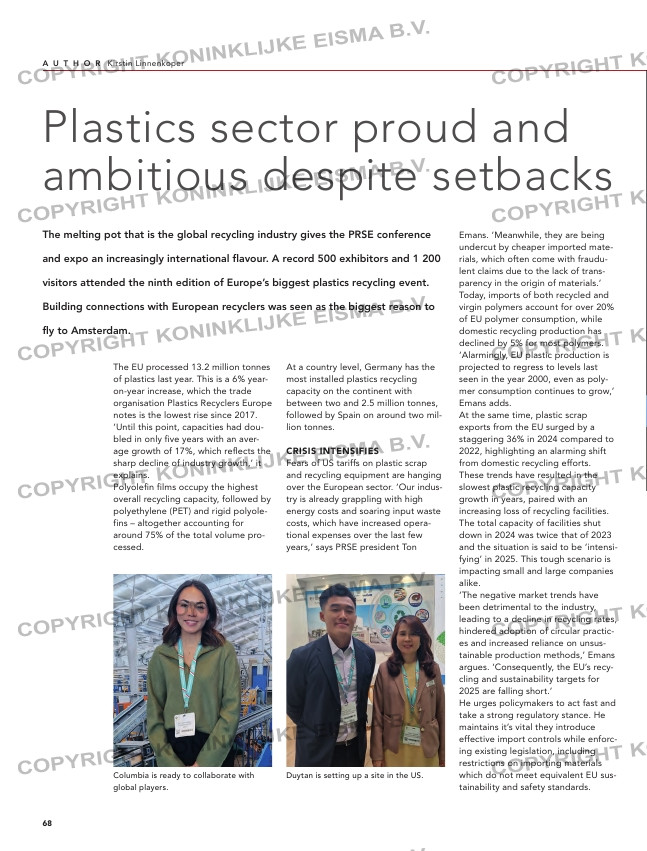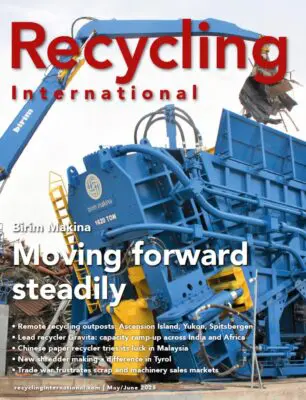Page 68 from: Recycling International May/June issue

68
Plastics sector proud and
ambitious despite setbacks
The melting pot that is the global recycling industry gives the PRSE conference
and expo an increasingly international flavour. A record 500 exhibitors and 1 200
visitors attended the ninth edition of Europe’s biggest plastics recycling event.
Building connections with European recyclers was seen as the biggest reason to
fly to Amsterdam.
‘These measures are crucial for the
plastic recycling industry’s survival,
which has already invested EUR 5 bil-
lion between 2020 and 2023 just to
meet mandatory targets.’
‘DATA IS POWER’
‘At times such as these, having the
latest price information can make a
huge difference. Data is power,’ says
Enzo Filocco, business development
manager at commodity data provider
ICIS. ‘This is especially the case for
plastics, which is a hot commodity
right now.’
The company’s expertise dates back
150 years, establishing its market
prices as an industry benchmark
around the world. ICIS’ latest innova-
tion is a chatGPT function for its sub-
scribers. Filocco believes this use of
artificial intelligence (AI) is the future.
‘You ask the chatbot any questions
The EU processed 13.2 million tonnes
of plastics last year. This is a 6% year-
on-year increase, which the trade
organisation Plastics Recyclers Europe
notes is the lowest rise since 2017.
‘Until this point, capacities had dou-
bled in only five years with an aver-
age growth of 17%, which reflects the
sharp decline of industry growth,’ it
explains.
Polyolefin films occupy the highest
overall recycling capacity, followed by
polyethylene (PET) and rigid polyole-
fins – altogether accounting for
around 75% of the total volume pro-
cessed.
At a country level, Germany has the
most installed plastics recycling
capacity on the continent with
between two and 2.5 million tonnes,
followed by Spain on around two mil-
lion tonnes.
CRISIS INTENSIFIES
Fears of US tariffs on plastic scrap
and recycling equipment are hanging
over the European sector. ‘Our indus-
try is already grappling with high
energy costs and soaring input waste
costs, which have increased opera-
tional expenses over the last few
years,’ says PRSE president Ton
Emans. ‘Meanwhile, they are being
undercut by cheaper imported mate-
rials, which often come with fraudu-
lent claims due to the lack of trans-
parency in the origin of materials.’
Today, imports of both recycled and
virgin polymers account for over 20%
of EU polymer consumption, while
domestic recycling production has
declined by 5% for most polymers.
‘Alarmingly, EU plastic production is
projected to regress to levels last
seen in the year 2000, even as poly-
mer consumption continues to grow,’
Emans adds.
At the same time, plastic scrap
exports from the EU surged by a
staggering 36% in 2024 compared to
2022, highlighting an alarming shift
from domestic recycling efforts.
These trends have resulted in the
slowest plastic recycling capacity
growth in years, paired with an
increasing loss of recycling facilities.
The total capacity of facilities shut
down in 2024 was twice that of 2023
and the situation is said to be ‘intensi-
fying’ in 2025. This tough scenario is
impacting small and large companies
alike.
‘The negative market trends have
been detrimental to the industry,
leading to a decline in recycling rates,
hindered adoption of circular practic-
es and increased reliance on unsus-
tainable production methods,’ Emans
argues. ‘Consequently, the EU’s recy-
cling and sustainability targets for
2025 are falling short.’
He urges policymakers to act fast and
take a strong regulatory stance. He
maintains it’s vital they introduce
effective import controls while enforc-
ing existing legislation, including
restrictions on importing materials
which do not meet equivalent EU sus-
tainability and safety standards.
A U T H O R Kirstin Linnenkoper
Columbia is ready to collaborate with
global players.
Duytan is setting up a site in the US.
Innovation has never been
more important.
68-69-70_prse.indd 68 10-04-2025 14:30



